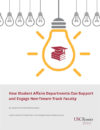
How student affairs departments can support non-tenure-track faculty
A new guide by Daniel Scott and Adrianna Kezar details ways student affairs departments and non-tenure-track faculty can collaborate.
Student affairs departments and faculty share an important goal: to support the success and engagement of their students. Yet while these two groups rely on each other for resources, skills and expertise, collaboration between them has become more challenging in the last few decades. The growing numbers of part-time, adjunct faculty on many campuses—and, relatedly, the shrinking numbers of full-time, tenured and tenure-track faculty—have meant fewer faculty members have the institutional support and availability to contribute to student success and engagement.
A new guide from the Pullias Center seeks to help student affairs departments and non-tenure-track faculty better connect. “How Student Affairs Departments Can Support and Engage Non-Tenure-Track Faculty” highlights the many opportunities student affairs departments have to work with non-tenure-track faculty in furthering its student services mission—and, in turn, to support these faculty in their efforts to foster student learning and success.
The guide is the latest publication from The Delphi Project for the Changing Faculty and Student Success, an effort of the Pullias Center to help create new faculty models and better support faculty off the tenure track to enhance higher education institutions.
“We created this guide in response to requests from student affairs departments that wanted to work more closely with non-tenure-track faculty on their campuses,” said Daniel Scott, a research assistant at the Pullias Center who co-authored the guide. “As this new publication shows, both groups have a lot to gain a lot through working together.”
Aimed at student affairs leaders and professionals, this guide begins by providing background on changing faculty trends and an introduction to the different types of non-tenure-track faculty on campuses today. The guide then explores the links between the mission of student affairs departments and non-tenure-track faculty, and helps the departments identify ways to work with and support non-tenure-track faculty.
Throughout, the guide offers prompts and worksheets for hands-on assessment, creative brainstorming and action-taking.
“Student affairs practitioners are an essential partner in creating a robust learning environment and so their support for contingent faculty is pivotal to addressing this challenge on campus,” said Adrianna Kezar, co-director of the Pullias Center and a co-author of the guide. “The Pullias Center aims for actionable resources that address problems and create solutions for challenges on campus, and this resource fits into our tradition of providing these type of resources. It provides a practical place to begin and concrete steps to take in order to support and amplify each others’ work.”
The guide includes a foreword by Kevin Kruger and Amelia Parnell of NASPA—Student Affairs Administrators in Higher Education, an organization that has long emphasized the role of academic and student affairs collaboration in creating a successful learning environment.
“This publication provides context for why it’s important to move beyond siloed approaches,” said Parnell. “It’s a good time for this discussion as we consider the growing population of non-tenure-track faculty today.”
In addition to this new publication for student affairs departments, The Delphi Project offers guides specific to centers for teaching and learning and institutional researchers to help those groups engage with non-tenure-track faculty. Those and other tools and publications are available on The Delphi Project website.

How Student Affairs Departments Can Support and Engage Non-Tenure-Track Faculty
Daniel Scott, Adrianna Kezar (2019)
This guide, created by The Delphi Project on the Changing Faculty and Student Success in collaboration with NASPA, highlights the many opportunities student affairs departments have to work with non-tenure-track faculty in furthering its student services mission---and, in turn, to support these faculty in their efforts to foster student learning and success.
Categories: Delphi Project, Student Success, Guides
adjunct faculty non-tenure-track faculty student success tools
Download 810.40 KB 16406 Downloads
Scott, D. & Kezar, A. (2019). How student affairs departments can support and engage non-tenure-track faculty. Los Angeles, CA: Pullias Center for Higher Education, University of Southern California.
The Delphi Project has received generous funding from The Spencer Foundation, The Teagle Foundation, The Carnegie Corporation of New York and TIAA-CREF Research Institute.